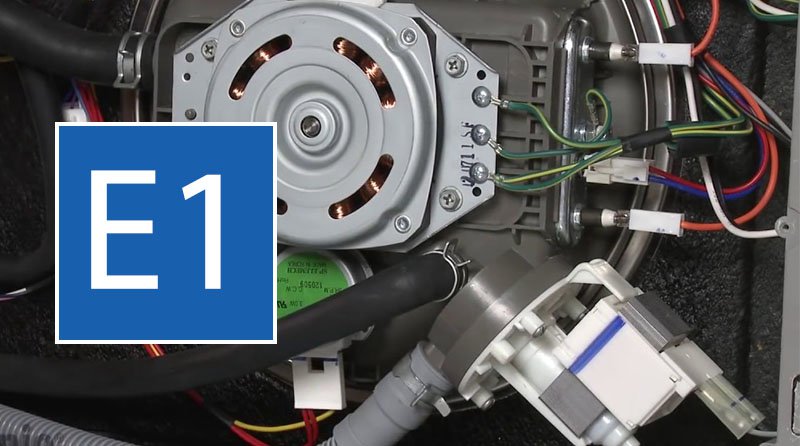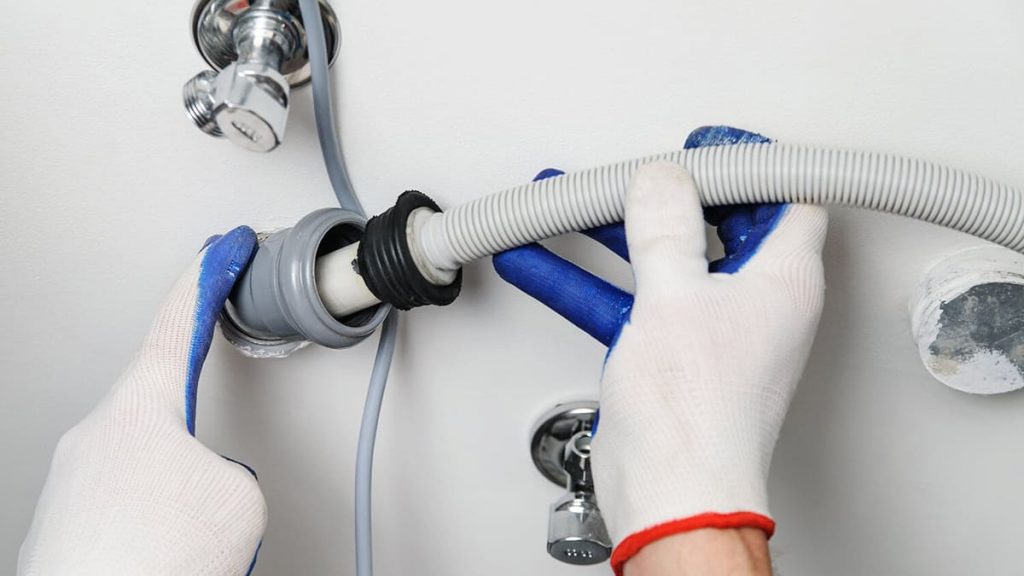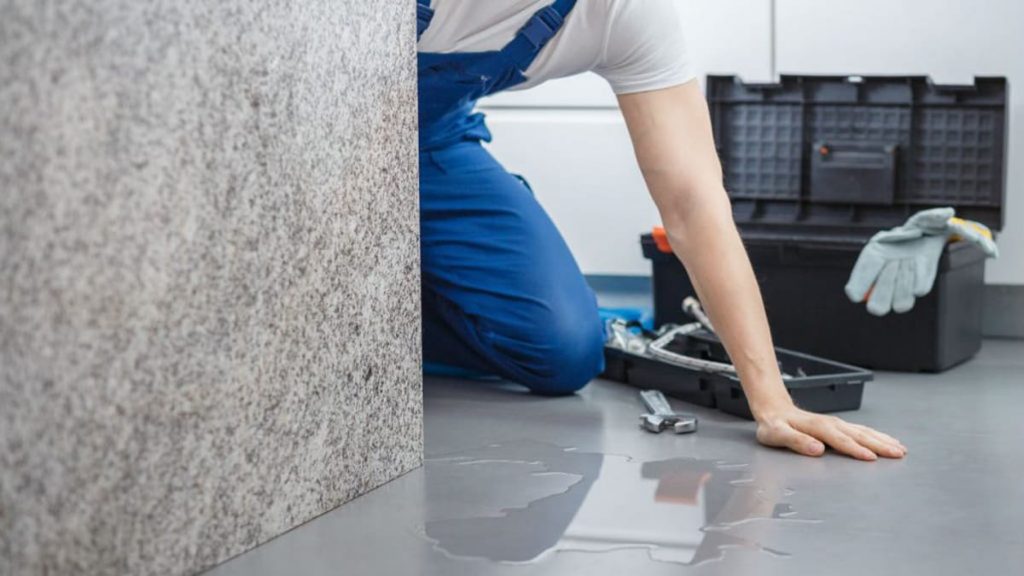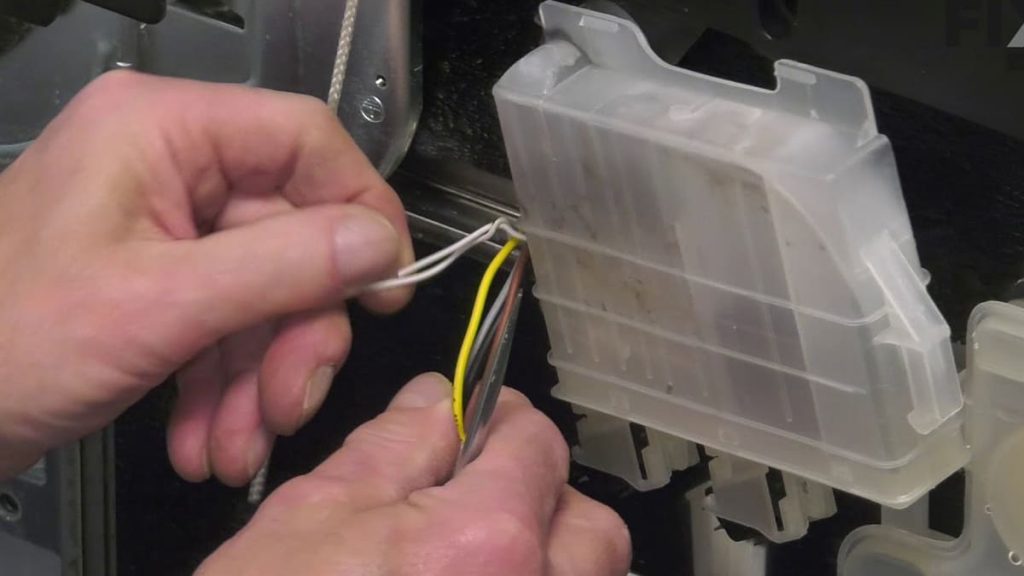In LG dishwashers, the E1 error code indicates that the running pump is not getting the back pressure. Most likely, the drain hose is leaking. There are a number of steps, which can help you clear the error and get the dishwasher back to work.
When the LG dishwasher gives an E1 error, it means that the Aqua-stop system has worked during operation. It signals that there is probably a leak somewhere. Due to the fact that water enters the drain pan, the flood sensor is triggered. In this situation, the drain pump starts pumping water out of the dishwasher continuously.
The instructions below will help you find the causes of the E1 error.
What causes the E1 error in the LG dishwasher
An E1 error is caused by one of several reasons.
- The dishwasher was installed and connected incorrectly.
- There is too much detergent in the machine, which caused the dispenser to overflow.
- The dishes were loaded incorrectly.
- Water leaks into the drain pan.
- There are problems with the float switch.
- There was a malfunction of the drain pump;
7. There is a blockage.
Install the drain hose properly
First, carefully inspect the drain hose of the dishwasher. Make sure that there are no kinks anywhere, and that there is no damage anywhere in the hose itself through which water could flow. If during the inspection such damage was found, then only replacing the hose will help eliminate error E1.
In the event that the integrity of the drain hose is not broken, pay attention to the places where it is connected to other elements of the device. It is possible that the tightness has been broken somewhere and a leak occurs in these places. Leaks are easier to detect while the machine is running. If this is the reason, then it is necessary to tighten the hose tightly at the joints.
Is the hose positioned lower than the base?
- If the drain hose outlet is placed below the base, the dishwasher may drain too early. This can result in the appearance off the E1 error code.
- Please, make sure that the end of the hose is located at least 10 inches from the bottom.
- This will prevent premature syphoning of water from the tub.
- Make sure the drain hose is not damaged.
- If it is, replace it.
Use detergents properly
- Using the wrong type of detergent can produce excess suds.
- Use detergent types specified in the instruction manual only.
- Failure to use the right type of detergent can lead to excess suds.
- Excess suds will not let the machine to wash the dishes properly.
- E1 error code appears when there is too much suds.
- Make sure that the detergent is intended for automatic dishwashers.
Make sure the door is not leaking
Leaks that cause an E1 error may not be associated with a drain hose, but with the following elements:
- door;
- washing chamber;
- LG dishwasher tray.
Carefully inspect the washing chamber, make sure that there are no cracks in it. Examine the perimeter of the door. The rubber seal must carefully adhere to the surface. If you find even the slightest gap or tear, you will have to replace the seal. If this is not done, then the E1 error will occur again due to constant leakage. Water may leak into the sump. Carefully inspect the places of possible leakage: the body and hoses.
Load dishes properly
Check the dishes after loading: are there oversized pans and pots?
- The positioning of large items can influence the distribution of water around the tub and lead to excess water.
- The system can detect excess water as a sign of flood and produce errors.
- Place all large items correctly as shown in the instruction manual.
- Make sure they do not hold water.
Check the sump and float assemblies: if there are faulty parts, replace them.
Float sensor
The Aqua-stop electronic system is a float sensor located in the sump. If water begins to accumulate there, the sensor is triggered and error E1 is displayed on the panel of the LG dishwasher. The cause of water accumulation can be blockages, as well as problems with the drain pump. Check all elements where blockages may form and clean them.
However, if there is a malfunction of the float sensor itself, then an error will occur even if water does not accumulate in the pan.
Conclusion
Some of the problems associated with the occurrence of an E1 error in an LG dishwasher can be solved independently. This is the replacement of the drain hose, the elimination of blockages, the change of detergent.
However, if there is a suspicion that there has been a breakdown of the machine components, pump, sensors, accurate diagnostics will be needed. It must be carried out in a certified service center. It is better to entrust the repair of these elements to specialists.



